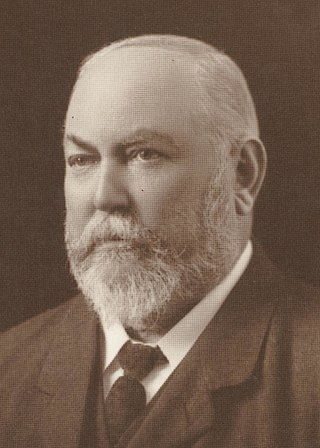Related Research Articles

Sir John Forrest was an Australian explorer and politician. He was the first premier of Western Australia (1890–1901) and a long-serving cabinet minister in federal politics.
The human history of Western Australia commenced between 40,000 and 60,000 years ago with the arrival of Aboriginal Australians on the northwest coast. The first inhabitants expanded across the east and south of the continent.
The Swan River Colony, also known as the Swan River Settlement, or just Swan River, was a British colony established in 1829 on the Swan River, in Western Australia. This initial settlement place on the Swan River was soon named Perth, and it became the capital city of Western Australia.

John Septimus Roe was the first Surveyor-General of Western Australia. He was a renowned explorer, a member of Western Australia's legislative and executive councils for nearly 40 years, but also a participant in the Pinjarra massacre on 28 October 1834.

Alexander Forrest CMG was an explorer and surveyor of Western Australia, and later also a member of parliament.

The Maitland Brown Memorial, also known as Explorers' Monument, is a monument located in Esplanade Park in Fremantle, Western Australia. Unveiled on 8 February 1913, it is approximately 6 metres (20 ft) high, and consists of a head and shoulders statue of Maitland Brown sitting on granite pedestals on a granite base inset with five plaques, one depicting three explorers, Frederick Panter, James Harding and William Goldwyer. Brown died on 8 July 1905, 7 years prior to the unveiling of the monument, and Panter, Harding and Goldwyer 48 years prior on 13 November 1864. The monument was commissioned by George Julius Brockman who is depicted by one of the five plaques, and the statue of Brown was sculpted by Pietro Porcelli. Because the monument as originally erected is biased, such as by celebrating the colonists "as intrepid pioneers" in contrast to the Aboriginal people that "are condemned as treacherous natives", an additional plaque was added on 9 April 1994 but leaving the original offensive and biased aspects in place.
Henry Wildman was a convict transported to Western Australia, whose claims to have found gold in the Kimberley region prompted exploration of the area during 1864. However, Wildman declined to provide the exact location and no gold was found. Little is known of Wildman's origins, or his life after 1864.
James Harding was a British-Australian pastoralist and explorer in colonial Western Australia. While exploring in the Kimberley region in 1864, he was killed by Aboriginal Australians. In February 1913, a monument to Panter, Harding, Goldwyer and Brown, the Explorers' Monument, was unveiled in Fremantle.
Frederick Kennedy Panter was a police officer, pastoralist and explorer in colonial Western Australia. While exploring in the Kimberley region of Western Australia in 1864, he was killed by Aboriginal Australians.

The La Grange expedition was an expedition in 1865 to the vicinity of Lagrange Bay in the Kimberley region of Western Australia. Led by Maitland Brown, the expedition initially searched for three settlers who had failed to return from an earlier exploring expedition. The three men were eventually found dead, having been speared and clubbed to death by Aboriginal Australians, some apparently in their sleep. Between six and twenty Aboriginal Australians were subsequently killed by members of the expedition in a controversial protracted fight that is often now referred to as the La Grange Massacre.
David Bras Francisco was a member of the La Grange expedition of 1864, which searched for three men missing in the Kimberley region of Western Australia.

York is the oldest inland town in Western Australia, situated on the Avon River, 97 kilometres (60 mi) east of Perth in the Wheatbelt, on Ballardong Nyoongar land, and is the seat of the Shire of York.

Maitland Brown was an explorer, politician and pastoralist in colonial Western Australia. He is known as the leader of the La Grange expedition and massacre, which searched for and recovered the bodies of three colonists killed by Aboriginal Australians, and killed between six and twenty Aboriginal Australians that remains controversial to this day.

The Bindjareb, Binjareb, Pindjarup or Pinjareb are an Indigenous Noongar people that occupy part of the South West of Western Australia.
Charles Cooke Hunt was an English explorer who led four expeditions into the interior of Western Australia between 1864 and 1866.

Robert John Sholl was a government administrator, magistrate, explorer, journalist, entrepreneur, harbourmaster, customs official, postmaster and lay reader in Western Australia (WA), during the colonial era. Because of his multiple, simultaneous roles, which carried judicial, political, cultural and commercial power and influence, Sholl is regarded as a significant figure in the history of North-West Australia, at an early stage of its settlement by Europeans.
Lockier Clere Burges, also known as L. C. Burges junior, was prominent and controversial in Western Australia as an entrepreneur, explorer and author.
The Karajarri are an Aboriginal Australian people, who live south-west of the Kimberleys in the northern Pilbara region, predominantly between the coastal area and the Great Sandy Desert. They now mostly reside at Bidyadanga, south of Broome. To their north live the Yawuru people, to the east the Mangala, to the northeast the Nyigina, and to their south the Nyangumarta. Further down the coast are the Kariera.
Captain James Harding was the third harbourmaster at the port of Fremantle (1851–1867).
References
- Erickson, Rica, ed. (1979). Dictionary of Western Australians 1829–1914. Nedlands, Western Australia: University of Western Australia Press. ISBN 0-85564-163-0.
- Forrest, Kay (1996). The Challenge and the Chance: The Colonisation and Settlement of North West Australia 1861–1914. Victoria Park, Western Australia: Hesperian Press. ISBN 0-85905-217-6.